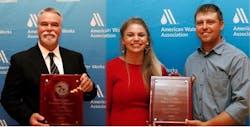CHICAGO, JUNE 6, 2018 -- The Great Lakes Protection Fund and American Water Works Association have announce the winners of the inaugural Water Utility Energy Challenge (WUEC), an innovative program which engaged water operators in a competition to reduce the emissions sourced in their energy generation.
The inaugural 2017-2018 competition, focused on the Great Lakes Basin, was aimed at connecting the utilities with new innovative software that reduces mercury and other emissions while reducing the utility's operations and management costs.
"We're really impressed with the breadth of the WUEC winners. They represent a wide range of communities, from small towns to large urban areas, and epitomize the next generation of cutting-edge water utilities. The winners proved that all utilities can use the cleanest energy to deliver safe drinking water to their customers and significantly reduce the associated emissions of mercury, lead, carbon and nitric oxide. It is the sort of thing that makes a big difference," noted AWWA CEO David LaFrance.
The winners are:
- Water Utility Emissions Champion, $20,000 Prize - City of Ann Arbor, Ann Arbor, Michigan
- Water Utility Green Champion, $10,000 Prize - City of Bayfield, Bayfield, Wisconsin
- Best Pilot Project - Great Lakes Water Authority (GLWA), Detroit, Michigan
- Technical Leader - City of Highland Park, Highland Park, Illinois
- Carbon Reduction Leader - Onondaga County Water Authority (OCWA), North Syracuse, New York
David Rankin, the vice president of programs for GLPF, remarked: "By using innovative technologies to protect the Great Lakes, the WUEC winners are a testament to the creativity and innovation needed to run a successful water utility today. We're pleased with the emission reductions from this small pilot program. The carbon reduction alone was 1.5 million pounds and the overall emissions reduction was equivalent to approximately 2,500 houses being removed from the system. With this ambitious start, when they scale up, these water utilities could easily mitigate more than five times that amount."
More information on the challenge can be found by visiting AWWA.org/competition.



